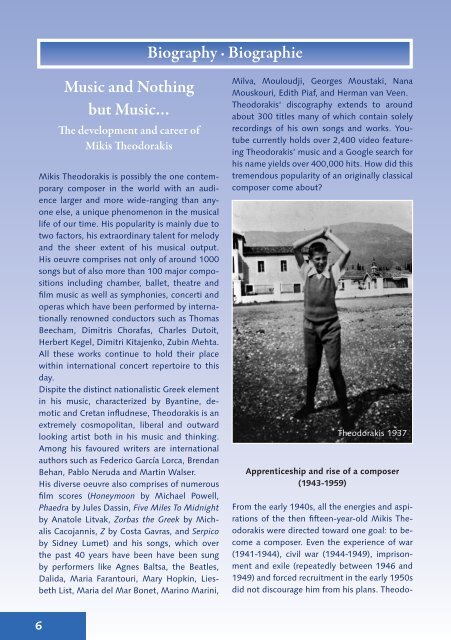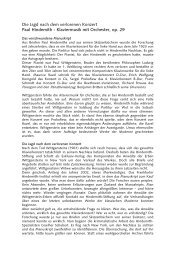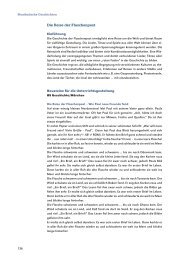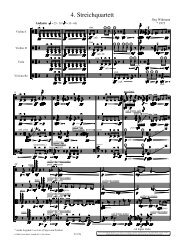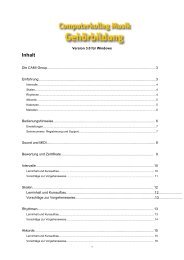Mikis Theodorakis - Schott Music
Mikis Theodorakis - Schott Music
Mikis Theodorakis - Schott Music
You also want an ePaper? Increase the reach of your titles
YUMPU automatically turns print PDFs into web optimized ePapers that Google loves.
Biography · Biographie<br />
<strong>Music</strong> and Nothing<br />
but <strong>Music</strong>…<br />
The development and career of<br />
<strong>Mikis</strong> <strong>Theodorakis</strong><br />
<strong>Mikis</strong> <strong>Theodorakis</strong> is possibly the one contemporary<br />
composer in the world with an audience<br />
larger and more wide-ranging than anyone<br />
else, a unique phenomenon in the musical<br />
life of our time. His popularity is mainly due to<br />
two factors, his extraordinary talent for melody<br />
and the sheer extent of his musical output.<br />
His oeuvre comprises not only of around 1000<br />
songs but of also more than 100 major compositions<br />
including chamber, ballet, theatre and<br />
film music as well as symphonies, concerti and<br />
operas which have been performed by internationally<br />
renowned conductors such as Thomas<br />
Beecham, Dimitris Chorafas, Charles Dutoit,<br />
Herbert Kegel, Dimitri Kitajenko, Zubin Mehta.<br />
All these works continue to hold their place<br />
within international concert repertoire to this<br />
day.<br />
Dispite the distinct nationalistic Greek element<br />
in his music, characterized by Byantine, demotic<br />
and Cretan infludnese, <strong>Theodorakis</strong> is an<br />
extremely cosmopolitan, liberal and outward<br />
looking artist both in his music and thinking.<br />
Among his favoured writers are international<br />
authors such as Federico García Lorca, Brendan<br />
Behan, Pablo Neruda and Martin Walser.<br />
His diverse oeuvre also comprises of numerous<br />
film scores (Honeymoon by Michael Powell,<br />
Phaedra by Jules Dassin, Five Miles To Midnight<br />
by Anatole Litvak, Zorbas the Greek by Michalis<br />
Cacojannis, Z by Costa Gavras, and Serpico<br />
by Sidney Lumet) and his songs, which over<br />
the past 40 years have been have been sung<br />
by performers like Agnes Baltsa, the Beatles,<br />
Dalida, Maria Farantouri, Mary Hopkin, Liesbeth<br />
List, Maria del Mar Bonet, Marino Marini,<br />
Milva, Mouloudji, Georges Moustaki, Nana<br />
Mouskouri, Edith Piaf, and Herman van Veen.<br />
<strong>Theodorakis</strong>‘ discography extends to around<br />
about 300 titles many of which contain solely<br />
recordings of his own songs and works. Youtube<br />
currently holds over 2,400 video featureing<br />
<strong>Theodorakis</strong>’ music and a Google search for<br />
his name yields over 400,000 hits. How did this<br />
tremendous popularity of an originally classical<br />
composer come about?<br />
<strong>Theodorakis</strong> 1937<br />
Apprenticeship and rise of a composer<br />
(1943-1959)<br />
From the early 1940s, all the energies and aspirations<br />
of the then fifteen-year-old <strong>Mikis</strong> <strong>Theodorakis</strong><br />
were directed toward one goal: to become<br />
a composer. Even the experience of war<br />
(1941-1944), civil war (1944-1949), imprisonment<br />
and exile (repeatedly between 1946 and<br />
1949) and forced recruitment in the early 1950s<br />
did not discourage him from his plans. Theodo-<br />
6


